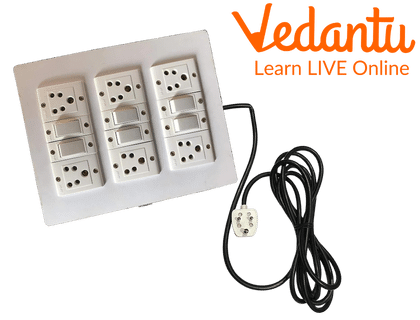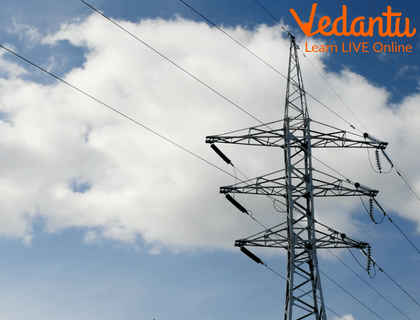




What is an Insulator?
Those substances which do not allow electricity to pass through them are called insulators. Examples of these materials include rubber, plastic, wood, glass, and also air. Electrical insulators, such as glass, rubber, ceramic and plastic, exhibit a resistance that prevents or completely prevents electricity from travelling.
Most electrical items are made using insulators to keep them safe. Plugs, for example, have plastic cases. Electrical cables are wrapped in plastic, which is flexible as well as insulating. In electrical circuits, the copper wires are coated in plastic because this prevents the overflowing of electricity.

Insulator
Uses of Insulators
Electrical insulators are mainly can be seen in homes, streets, and offices. Electrical insulators are used in different types of devices and equipment where no flow of electricity is required. Electrical insulators have wide use.
Electrical insulators prevent electrical equipment from generating high voltage. If human skin comes into contact with an active naked wire, it will conduct electrical charges and a current will be felt. Hence, insulators are used on bare wires which prevent the flow of electric charges. Insulators are used in many places.
The Common Uses of Electrical Insulators are Given Below:
Prevents the production of high voltage in the electrical circuit.
Helps reduce energy costs.
Controlling the emission of pollutants.
Improves process performance.
Prevents electric shock.
Allows soundproofing of equipment.
Application of Electric Insulator
Some of the major applications of electric insulators are given below:
Electrical Wiring Coating
The Coating on Electric Poles on Roads
Circuit Board
Coating of Cables
High Voltage Equipment

Electric Board
Types of Insulators Used in Transmission Line
The element of the Transmission Line by which the line conductors are insulated from the supports is known as a Line Insulator. Some important types of insulators in transmission lines are given below:
Pin Type Insulator - This type of insulator is used in distribution systems. The voltage potential of this insulator is 11kV. It is made with a high mechanical strength material. These are connected in vertical and horizontal positions. This insulator is simple to manufacture and requires less maintenance than other types.
Suspension Type Insulator - It is also called disc insulator and the designing of these insulators can be done using materials like porcelain or glass. The voltage capability of suspension insulators ranges from 11 kV to 765 kV. It is used in overhead transmission lines by providing greater flexibility.
Strain Insulator - It is similar to suspension-type insulators as it is used in overhead transmission systems but its specifications and functions are somewhat different. The strain insulator has a voltage potential of 33kV.
Shackle Insulator - These insulators are small in size and used in overhead distribution systems. The connection of this insulator can be done using a metal strip. This insulator has a voltage capacity of 33 kV and works in bend or circular turn conditions.

Transmission Line
Commonly Used Building Insulation Materials
Fibreglass is cheap but requires careful handling.
Mineral wool is effective, but not fire-resistant.
Cellulose is fire-resistant, eco-friendly, and effective but difficult to apply.
Polyurethane is a good insulation product, although not particularly environmentally friendly.
Solved Questions
Write True or False.
Air is an example of an insulator. - True.
Plugs do not have plastic cases. - False.
Suspension-type insulators are used in transmission lines. - True.
Glass is not an insulator. - False.
Learning by Doing
Kids Activity: Find which one is not an insulator.
Paper
Rubber
Plastic
Glass
Mercury
Wood
Summary
In this article, we have discussed about what is insulators, the uses of Insulators, the application of electric insulators, the types of insulators used in transmission line, and commonly used building insulation materials. Insulators are very important for keeping us safe from electricity. We have seen many examples of insulators in our daily life. For example, plugs with plastic cases and electric wire coated with rubber or plastic.
FAQs on Uses of Insulators
1. What exactly is an insulator?
An insulator is a material that does not allow heat or electricity to pass through it easily. Think of it as a barrier that blocks the flow. This property makes insulators very useful for safety and controlling temperature.
2. What are some common examples of insulators we see around us?
You can find many insulators in your daily life. Some common examples include:
- Plastic (used for covering wires, switches, and bottles)
- Wood (used in furniture and handles of cooking pots)
- Rubber (used in gloves, tires, and shoe soles)
- Glass (used in windows and cups)
- Cotton and Wool (used in clothes to keep us warm)
- Air (which is why we wear layers of clothing to trap air and stay warm)
3. How are insulators used for safety in our homes?
Insulators are essential for home safety. The plastic or rubber coatings on electrical cords prevent electric shocks if you touch them. The handles of cooking pans are made of wood or plastic to protect your hands from getting burnt by heat. Similarly, electric switches are made of insulating plastic to ensure they are safe to touch.
4. Why are cooking pan handles made of plastic or wood?
Cooking pan handles are made from materials like plastic or wood because they are good heat insulators (or poor conductors of heat). While the metal part of the pan gets very hot on the stove, the insulating handle stays cool enough to touch, allowing you to hold the pan safely.
5. Why is it so important to use insulators for electrical wires?
It's crucial to cover electrical wires with an insulator like plastic. This serves two main safety purposes: it prevents accidental electric shocks and it stops wires from touching each other, which could cause a short circuit and potentially start a fire.
6. Can a material be a good insulator for both heat and electricity?
Yes, definitely. Many materials are excellent insulators for both heat and electricity. For instance, glass, rubber, and most plastics are very effective at blocking the flow of both electric current and heat. This is why they are so versatile and used in everything from electrical equipment to kitchenware.
7. What would happen if we used a conductor, like metal, for a wire covering instead of an insulator?
Using a conductor for a wire covering would be incredibly dangerous. It would create a live, uninsulated wire. Anyone touching it would get a severe electric shock, and if it touched another metal object, it would cause a short circuit, leading to sparks, power failure, and a high risk of fire.
8. Are all insulators equally good at insulating?
No, all insulators are not equally effective. Some materials are much better at blocking heat or electricity than others. For example, rubber is a much stronger electrical insulator than dry wood. The choice of insulator depends on the specific job it needs to do and how much protection is required.









